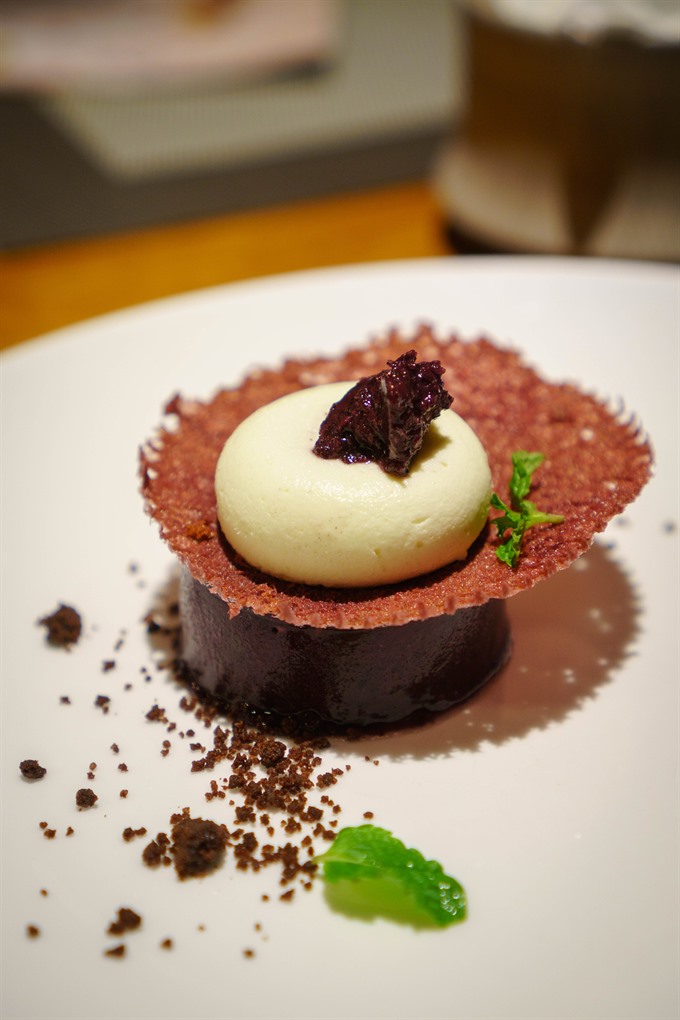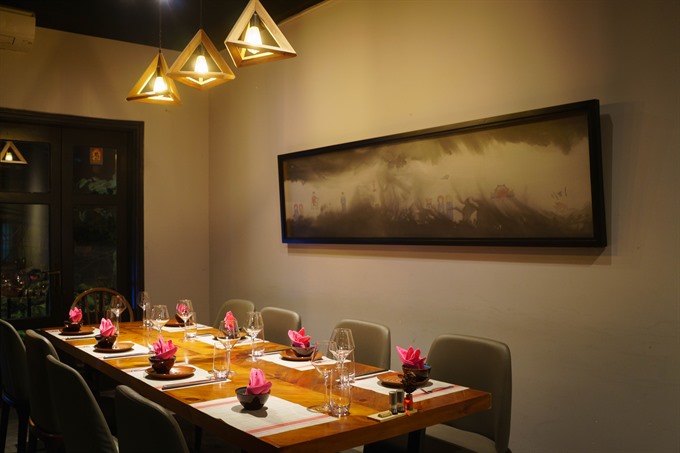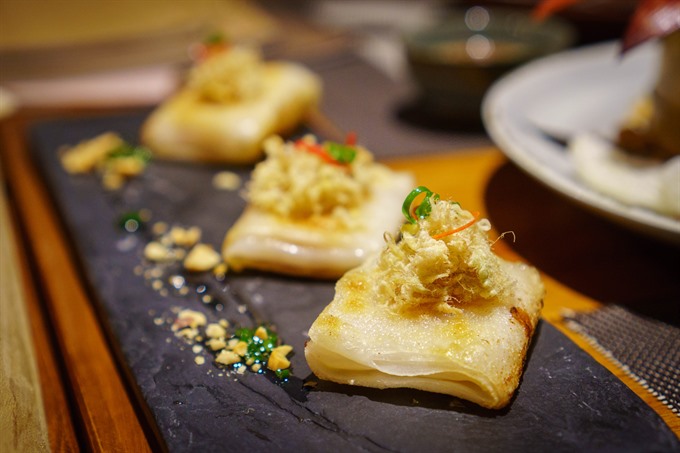 Restaurant Review
Restaurant Review

With traditional flavours and a modern flair, The T-Art is impressing diners and changing the way we eat
 |
| Succulent: Whole roasted pigeon accompanied by sticky rice and a complex homemade chili sauce. – Photo Michael Darling |
By Zander Guzy-Sprague
When Chef Hải Anh teamed up with co-founder and CEO Thái Thanh Thủy to open The T-Art, they had a bold vision for the future of Vietnamese food. The restaurant would present quality local ingredients and traditional flavours in striking, modern ways. It would shrink portion sizes and balance the nutrients of each dish to show satisfaction can be achieved without gluttony. It would have top-rate service and prices low enough to reach a wider base of local customers.
So the two entrepreneurs opened The T-Art – short for “the taste of art” – a year and a half ago to bring their vision to life. They were confident, but they knew their modern concept was not what most people expect from a Vietnamese meal. “We thought it would take time for people to become familiar with healthy portions and not wasting food,” Thủy says.
Progress has been quicker than expected. A set-menu celebration of the restaurant’s first anniversary drew such positive reactions that they adopted a few of the dishes full time.
Speaking with Hải Anh and Thủy at the warmly decorated restaurant in Hà Nội’s Old Quarter, I ask what inspired their approach to Vietnamese food.
“We want to show Vietnamese people they can be proud of their cuisine and to show foreigners Vietnamese food can be at a very high level,” Hải Anh says.
We start with small “signature” plates that show off the chef’s intuitive presentation. First we taste the tamarind crab – a light intro that gives the sweetness of the seafood space to shine – and the magenta sticky rice with chicken. These self-contained balls of chewy rice open to reveal creamy mung bean and chicken. The dish recalls Hà Nội’s famous xôi but the flavour is deeper, leaving a hint of black pepper on the palate.
Next we turn to pan-fried phở. The slightly browned pockets are made from fresh rice noodles, filled with prawns and topped with dried pork and paired with a sweet and sour fish sauce. They’re delicious, at once familiar and new. Hải Anh points out the light smokiness from the frying pan: “It is the taste of the Vietnamese kitchen.”
 |
| Sweet and sour: Black sticky rice and yoghurt mousse at the T-Art. Great care is taken to select the perfect rice and let the flavours develop naturally as it ferments. – Photo Michael Darling |
 |
| Just relax: One of The T-Art’s understated but warm dining rooms. – Photo Michael Darling |
 |
| Old and new: Pan-fried phở embodies The T-Art’s mission to present Vietnamese classics in a beautiful, modern style. – Photo Michael Darling |
Between bites, the chef tells me she wants to prove Vietnamese food can pair with fine wine. Some menu items are followed by a suggested wine pairing and an explanation of why the marriage works. Despite this focus, there are only two wines by the glass on offer. “Wines need a reason to appear on the list,” Thủy says.
The phở was followed by an almost impossibly juicy chicken roulade filled with local herbs. Tougher local beef is marinated in a special chili sauce for the Vietnamese mini steak, which falls apart in my mouth despite maintaining its lean, muscled texture.
Costing between VNĐ69,000 (US$3) and 119,000 ($5) for an order of three small portions, the signature plates are not in the same price range as meals from the street vendors outside. But they are also far cheaper than the prices found at some of Hà Nội’s other fine dining establishments. The generous set dinner menu, named Ve Que (Back to Childhood), costs VNĐ549,000 ($24) per person. Thủy points out many places charge more for similar quality food.
Our main course is a whole roasted pigeon. De-boned and marinated for 24 hours in pandan leaves, this was the highlight of the meal. It was accompanied by charred sticky rice and dabs of vibrant chili sauce that lend heat and colour to the dish. At this point we were inspired to forsake our cutlery in favour of our hands, a decision supported by Hải Anh.
The last dish was the new chả cá lã vọng, the chef’s take on one of Hà Nội’s most famous meals. The dill and green onion are dialled back to make the marinated fish the centrepiece. The choice works; the fish crispy and delicious, with enough familiar chả cá flavour to recall the original.
Desert was black sticky rice with yoghurt mousse. Carefully selected rice from the mountains of Điện Biên Province is fermented for a week using a natural process and the result is tangy and balanced with no added sugar – the sweetness develops gradually during fermentation.
As the meal winds down, I remark that every choice – from the sourcing of local ingredients and the meticulous plating to the location on a block of Bát Đàn famous for its street food, the wine pairings and the high level of service – seems intentional.
Thủy nods: “It’s the way we live, the way we think, the way we behave here.”
This sums up their approach. Beyond just food, they want people to slow down and appreciate the art of a sublime dining experience.
“When people accept it, they will find more meaning inside,” Thủy says. “I hope people will find a small happiness here.”
So do they hope their approach will spread? Are smaller portions and a more intentional dining experience the future of Vietnamese food?
Chef Hải Anh doesn’t need time to mull over her answer: “Not hope. I’m sure.”
The T-Art Restaurant
Address: 46b Bát Đàn Street, Hà Nội
Tel: 024-3875-4646
Hours: 11 am to 2:30 pm and 6 to 10 pm daily
Comment: Upscale fusion with accessible pricing




